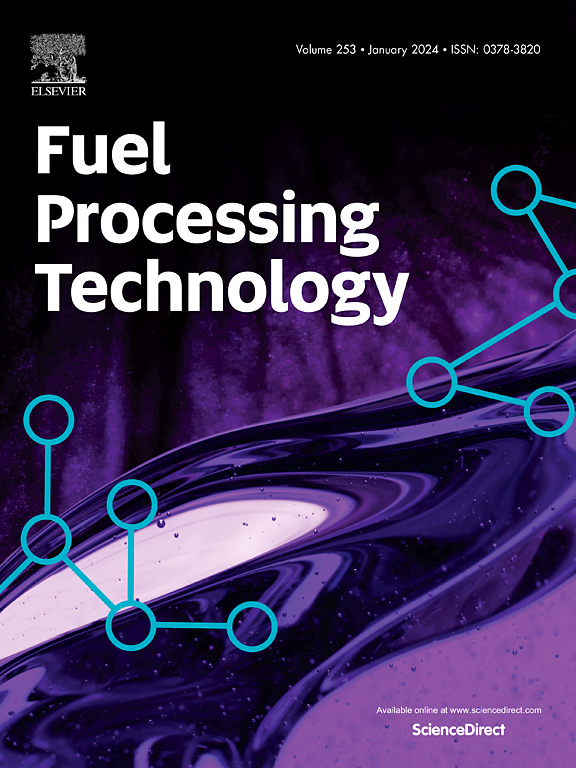A novel and efficient catalytic system composed of Ru-NbOPO4 and decane for the hydrodeoxygenation of polycarbonate waste into cycloalkane fuels
IF 7.2
2区 工程技术
Q1 CHEMISTRY, APPLIED
引用次数: 0
Abstract
Chemical recycling of polycarbonate (PC) waste can effectively upgrade PC to valuable chemicals. This work developed a novel catalytic system composed of Ru-NbOPO4 as the catalyst and decane as the solvent for the selective hydrodeoxygenation of PC waste to cycloalkanes, a potential additive for jet fuels. The depolymerization degree and product distribution under the condition of different catalysts and solvents were investigated. The results proved that the combination of Ru-NbOPO4 and decane exhibited the >99 % depolymerization degree of PC and > 99 % selectivity to cycloalkanes under 240 °C. The acidic sites in the NbOPO4 framework effectively enhanced the hydrodeoxygenation capacity of the catalyst. The catalytic system can achieve the total conversion of real PC wastes (discarded CDs and water buckets) into cycloalkanes with >99 % selectivity under 240 °C. The by-product CO2 derived from the carbonyl linking units in PC can also be converted into CH4 along with the formation of cycloalkanes in one-pot reaction, increasing the catalytic efficiency of the system and decreasing the emission of CO2. With the advantages of high selectivity to cycloalkanes and efficient for real waste PC, the developed catalytic system provides a new approach for the selective upgradation of PC waste to cycloalkane fuels.
一种新型高效的由Ru-NbOPO4和癸烷组成的催化体系用于聚碳酸酯废弃物加氢脱氧制备环烷烃燃料
聚碳酸酯(PC)废料的化学回收可以有效地将PC升级为有价值的化学品。本研究开发了一种以Ru-NbOPO4为催化剂,癸烷为溶剂的新型催化体系,用于PC废弃物选择性加氢脱氧制环烷烃,这是一种潜在的喷气燃料添加剂。考察了不同催化剂和溶剂条件下的解聚程度和产物分布。结果表明,Ru-NbOPO4与癸烷的结合具有PC和癸烷的99%的解聚度。在240℃下,对环烷烃有99%的选择性。NbOPO4骨架中的酸性位点有效地增强了催化剂的加氢脱氧能力。该催化体系可在240℃条件下,以99%的选择性将实际PC废弃物(废弃cd和水桶)全部转化为环烷烃。PC中羰基连接单元产生的副产物CO2也可以在一锅反应中随环烷烃的生成而转化为CH4,提高了体系的催化效率,减少了CO2的排放。该催化体系具有对环烷烃的高选择性和对真实废旧PC的高效处理的优点,为废旧PC选择性转化为环烷烃燃料提供了新的途径。
本文章由计算机程序翻译,如有差异,请以英文原文为准。
求助全文
约1分钟内获得全文
求助全文
来源期刊

Fuel Processing Technology
工程技术-工程:化工
CiteScore
13.20
自引率
9.30%
发文量
398
审稿时长
26 days
期刊介绍:
Fuel Processing Technology (FPT) deals with the scientific and technological aspects of converting fossil and renewable resources to clean fuels, value-added chemicals, fuel-related advanced carbon materials and by-products. In addition to the traditional non-nuclear fossil fuels, biomass and wastes, papers on the integration of renewables such as solar and wind energy and energy storage into the fuel processing processes, as well as papers on the production and conversion of non-carbon-containing fuels such as hydrogen and ammonia, are also welcome. While chemical conversion is emphasized, papers on advanced physical conversion processes are also considered for publication in FPT. Papers on the fundamental aspects of fuel structure and properties will also be considered.
 求助内容:
求助内容: 应助结果提醒方式:
应助结果提醒方式:


